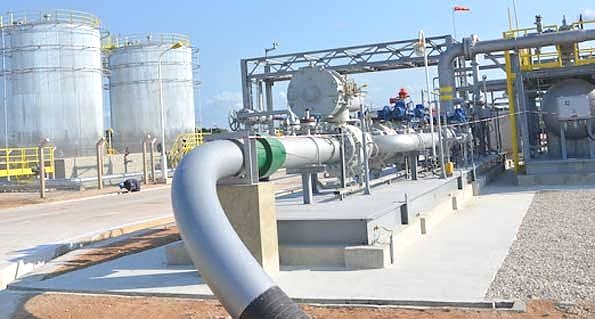Tanzania has earned and saved trillions of shillings from its natural gas deposits discovered during the post-colonial era, the government has said. Statistics indicate that between 2004 and June 2020, the use of natural gas from Mnazi Bay and Songo Songo enabled the government to save 38tri/- that would have been spent on procuring diesel to be used in power generation.
Acting Permanent Secretary in the Ministry of Energy, Eng. Felchesmi Mramba, stated this on behalf of the Minister for the portfolio, January Makamba. He made the statement on Tuesday this week when highlighting achievements that the country has attained in the oil and gas sector post-independence. Tanzania, he said, has reaped huge benefits from natural gas discoveries over the years and adoption of effective systems that enhanced service delivery in the oil and gas sector.
According to Eng. Mramba, the government has been implementing a number of initiatives aimed at utilizing the oil and gas sector adding positive contributions to the national economy. "Some of the achievements recorded include the discovery of natural gas in Songo Songo in 1974, Mnazi Bay (1982), Mkuranga (2007), Kiliwani North (2008) and the Deep Sea (2010)," he said.
Expounding further, he said available statistics shows that a total of 57,54 trillion cubic feet of natural gas have so far been discovered offshore and onshore, paving a way for introduction of natural gas in production of energy for industrial, domestic use as well as in vehicles. Moreover, by October this year, a total of 52 factories in Dar es Salaam, Coast and Mtwara regions had been connected to natural gas whereas two Compressed Natural Gas (CNG) vehicle filling stations have been established in Dar es Salaam and Mtwara. A total of 750 vehicles were installed with the CNG system by June 2021, according to available statistics.
"To a large extent, the use of natural gas has reduced dependency in power from the traditional source of hydropower plants whereas as of this November, 60 percent of electricity produced in Tanzania is from natural gas," he said. Eng. Mramba said between 2004 and June 2020, the use of natural gas from Mnazi Bay and Songo Songo enabled the government to save 38tri/- that would have been spent on procuring diesel to be used in power generation.
He said further that revenue from natural gas contributed a total of 208bn/- to the Oil and Gas Fund, from the financial year 2016/2017 following the completion of the Mtwara-Songo Songo-Dar es Salaam natural gas pipeline. According to Eng. Mramba, from 2015 up to December last year, the government raised a total of 441bn/- from different levies collected following the completion of the natural gas pipeline from Mtwara to Dar es Salaam.
In another development, the Tanzania Petroleum Development Corporation (TPDC) has paid a total of 10bn/- being dividends to the government during the 2018/2019 and 2019/2020 financial years. Moreover, the government made a huge step in introducing and maintaining the Bulk Procurement System (BPS) on importing petroleum products such as petrol, diesel, Jet- A1 and Kerosene.
"This has assured the country's security of fuel supply as well as control the demurrage charges for which, the government has so far saved 391bn/- that were spent before the introduction of the BPS," he said. He cited another success as the establishment of the Petroleum Upstream Regulatory Authority (PURA) that has played a great role in promoting local content in the Production Sharing Agreement (PSA) audit.
"The establishment of PURA and PSA audit has saved 35.91bn/-," he said He added: "Apart from PURA, the government also established the Energy and Water Energy Regulatory Authority (EWURA) that is responsible for technical and economic regulation of the electricity, petroleum, natural gas and water sectors in the country".
The authority is also mandated to put indicative and cap prices for petroleum products at wholesale and retail business. Another milestone achievement includes the establishment of the East African Crude Oil Pipeline (EACOP) for which a 1,441km long pipe will be built from Kabale in Uganda to Chongoleani, Tanga region in Tanzania. The project will cost 3.55billion US dollars for which the two governments have already signed Host Government Agreement (HGA) as well as the Shareholders' Agreement (SHA).
